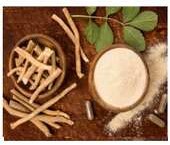Does D-aspartic Acid Increase Testosterone Levels?
Curious if D-Aspartic Acid really boosts testosterone? This natural supplement is gaining attention for supporting T levels, energy, and performance—let’s dive into how it works.

📅 Updated On Dec 10, 2025
In the realm of testosterone optimization, few supplements have garnered as much attention as D-aspartic acid (DAA). This naturally occurring amino acid has been touted as a game-changer for those seeking to elevate their testosterone levels, enhance muscle growth, and ignite their libido. But does the science support the hype?
As we delve into the latest research and expert insights, we'll separate fact from fiction and explore the efficacy of DAA in increasing testosterone levels. From its mechanism of action to real-world results, we'll examine the evidence and provide a comprehensive understanding of DAA's potential.
Whether you're a fitness enthusiast, a health-conscious individual, or simply seeking to optimize your hormone profile, this in-depth exploration will empower you with the knowledge to make informed decisions about your testosterone-boosting journey.
Join us as we uncover the truth about D-aspartic acid and its impact on testosterone levels in 2025
What is D-aspartic acid (DAA)?
D-aspartic acid (DAA) is a naturally occurring amino acid found in the body, particularly in the pituitary gland and testes. It plays a crucial role in regulating hormone production, including testosterone.
Popularity and uses
DAA gained popularity in the early 2000s as a dietary supplement, particularly among athletes and bodybuilders, due to its potential to:
1. Increase testosterone levels
2. Enhance muscle growth and strength
3. Improve fertility and libido
Its popularity stems from:
1. Promising early studies suggesting significant testosterone boosts
2. Availability as an over-the-counter supplement
3. Endorsements from fitness influencers and athletes
However, recent research has raised questions about its effectiveness, and some studies have found conflicting results. Despite this, DAA remains a popular supplement among those seeking natural testosterone support.
Attention Readers: Discover effective strategies to naturally support healthy testosterone levels. Learn about the best testosterone booster options for men overall health and fitness.
Does DAA Really Increase Testosterone Levels?
The question of whether DAA truly enhances testosterone levels has been a topic of considerable interest, prompting a thorough examination of various research studies and existing literature on the subject. Many studies have explored the efficacy and effectiveness of DAA supplements, revealing mixed results that suggest while some individuals may experience a boost in testosterone, others may not see significant changes. Additionally, when comparing DAA to alternative testosterone-boosting methods, such as lifestyle changes, dietary adjustments, or other supplements, it becomes clear that the effectiveness of DAA can vary widely among individuals, making it essential to consider personal health factors and goals when evaluating its potential benefits.
Benefits and Side Effects of DAA Supplements
Here's a detailed overview of the benefits and side effects of DAA supplements:
Potential Benefits:
1. Increased Testosterone: DAA may help boost testosterone levels, leading to improved muscle growth, strength, and libido.
2. Muscle Growth and Strength: Elevated testosterone levels can contribute to enhanced muscle mass and strength.
3. Improved Libido: Increased testosterone may lead to enhanced sexual desire and performance.
4. Fertility: DAA may also support fertility by improving sperm quality and motility.
Possible Side Effects:
1. Nausea and Stomach Discomfort: Some users may experience nausea, stomach cramps, or diarrhea. 2. Headaches: Mild to moderate headaches can occur due to changes in hormone levels. 3. Digestive Issues: Bloating, gas, or stomach discomfort may arise. 4. Fatigue: Some users may experience fatigue or lethargy. 5. Mood Changes: Hormonal fluctuations can lead to mood swings, irritability, or anxiety.
Must Read:
Best Time to Take Testosterone Booster for Maximum Results
Ultimate Guide to Testosterone-Boosting Foods for Muscle Growth
The Science Behind DAA and Testosterone
Lo! Let's dive into the science behind DAA and testosterone:
How DAA affects testosterone production:
DAA stimulates the release of gonadotropin-releasing hormone (GnRH) from the hypothalamus, which in turn:
1. Stimulates the pituitary gland to release luteinizing hormone (LH)
2. LH stimulates the testes to produce testosterone
Mechanisms of action:
1. GnRH regulation: DAA binds to GnRH receptors, increasing GnRH release 2. LH regulation: GnRH stimulates LH release, which then stimulates testosterone production 3. FSH regulation: DAA may also affect follicle-stimulating hormone (FSH) levels, which can impact testosterone production
Studies and research findings:
1. Early studies (2009-2012): Showed significant increases in testosterone levels (up to 42%) after DAA supplementation 2. Later studies (2013-2018): Found mixed results, with some showing minimal or no effect on testosterone levels 3. Meta-analysis (2020): Concluded that DAA supplementation results in a small, significant increase in testosterone levels (around 10-15%)
Remember, the science is constantly evolving, and more research is needed to fully understand DAA's impact on testosterone production.
Conclusion: Is DAA Right for You?
In conclusion, it is essential to recap the main highlights discussed throughout the text, emphasizing the significant aspects of DAA and its role in boosting testosterone levels. The evidence suggests that DAA can be an effective supplement for those looking to enhance their testosterone production, although individual results may vary. As we reflect on the findings, it is advisable for users to approach DAA with a balanced perspective, considering both its potential benefits and the need for further investigation into its long-term effects and optimal usage guidelines. Continued research in this area will be crucial to fully understand the implications of DAA supplementation and to refine recommendations for those interested in utilizing it for hormonal support.



